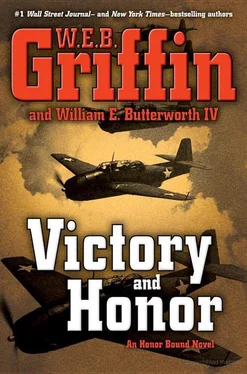“What the hell is aboard that sub?” Frade said.
“According to our information, U-234 was bound for Japan with a varied and very interesting cargo, some of which was either not listed on the manifest at all or listed under a false description. That is to say, in addition to a ton of mail—which, of course, almost certainly includes cash and diamonds—we’re told that U-234 took aboard five hundred sixty kilograms of uranium oxide. And passengers included both Nazi and Japanese officers, as well as certain scientists, two of whom the OSS was actively pursuing prior to the German surrender.”
“What’s that about?” Ashton asked. “That uranium?”
Dulles met Frade’s eyes for a moment before replying, “German scientists have been working on what might be called ‘an explosives amplifier.’ I don’t know much more than that about it . . .”
The hell you don’t! Frade thought.
You told me that uranium is what’s in the atom bomb.
“. . . except that we really don’t want the Japanese to get their hands on it. What I do know is that we can’t permit U-234 to get to Japan. And General Smith and I are agreed that it can’t get there.”
“General Smith?” Ashton asked.
“General Walter Bedell Smith, Eisenhower’s chief of staff,” Dulles clarified, and then saw something on Ashton’s face. “Why did you just nod understandingly, Ashton? Who else did you think I might be talking about?”
Ashton looked mildly uncomfortable, glanced at Frade, then shrugged. “Actually, until just now, I was wondering why the OSS deputy director for European operations had come to this backwater of the war. ‘He must certainly have more important things on his plate right now . ’”
“And now you think you understand?” Dulles said.
“At first, I thought your purpose, sir, forgive the vulgarism, was to cover Eisenhower’s ass vis-à-vis the Gehlen operation. He’s privy to it, isn’t he?”
“Is that what you understood?” Dulles asked softly, ignoring the question. “That was your analysis?”
“Yes, sir. That is, until you mentioned that half-ton of uranium oxide and then General Smith. I would guess that General Smith is one of the very few officers privy to the secret of the atomic bomb. That’s really why we have to take out U-234, isn’t it?”
Dulles glanced at Cletus Frade, then said, “Major Ashton, tell me what you know about—what did you say?—an ‘atomic’ bomb.”
“I know the Germans were trying to build one, and I know that we are.”
“And how did you come into this information, Major Ashton?” Dulles asked softly.
Dulles locked eyes momentarily with Frade again.
Frade shook his head to deny responsibility.
“Clete didn’t tell me, sir,” Ashton said.
“Clete didn’t even come close to it,” Technical Sergeant Jerry O’Sullivan offered. “All he told any of us was to keep our eyes and ears open to any mention of uranium, and to tell him immediately if we heard anything at all.”
“And, except for this one instance with Niedermeyer, we didn’t hear anything,” Ashton said.
“Niedermeyer?” Dulles said.
“Oberstleutnant Otto Niedermeyer—the first of two of Oberstleutnant Gehlen’s officers to arrive in Argentina—is the source of my information, sir.”
Ashton looked from Dulles to Frade, then back to Dulles, and went on: “Clete sent Jerry and me to San Martín de los Andes to see what, if anything, we might get Niedermeyer to tell us. Cutting to the chase, after we’d had a couple of drinks—more than a couple; in vino veritas , so to speak—I asked him why he thought you, sir, had trusted Colonel Gehlen. He replied, words to this effect, because Gehlen had given you the names of the Russian spies operating in the Manhattan Project, which he told me was the code name for our attempt to build an atomic bomb.”
“And once in possession of this information, what did you do with it?” Dulles asked evenly.
“I took it to Clete.”
“And?”
“Clete told me I was not to mention it to anyone, and then he sent me back to San Martín de los Andes to tell Niedermeyer that if Clete ever heard Niedermeyer had told this story—or anything at all about the Manhattan Project—to anyone else, Clete personally would shoot him.”
Dulles locked eyes with Frade again. Frade’s face showed that he was pleased with Ashton’s report of his “atomic bomb” behavior.
Dulles shrugged, shook his head, and exhaled audibly.
He then said: “Another masterful double cliché has suddenly popped into my brain: As no secret is safe if more than one person knows it, I guess we have to accept that the cow has escaped through the open door of the barn and there is no point in trying to get it back in.
“The truth is that Argentina is no longer a backwater of this war. As I started to say a moment ago, General Smith—and, yes, he is privy to the Manhattan Project—and I are agreed that we simply cannot permit U-234 to reach Japan. There are other reasons for me being here—despite other important things on my plate—but based on what credible information we have, sinking or, in an ideal world, capturing U-234 is perhaps the most important reason of all.
“And the reason Argentina is no longer a backwater is because General Smith and I agree again that U-234 cannot reach Japan without refueling at least once and that any refueling will have an Argentine connection.
“Naval experts at Eisenhower’s headquarters have suggested a scenario involving those twenty submarines which are alleged to have sailed for Argentina from Norway during the period from May first to May sixth.
“This scenario proposes that the subs are tankers. Manned by as few people as possible, they would rendezvous with U-234 at either a planned location or one determined by radio contact with her. The fuel would be transferred, the crew of the tanker submarine would transfer to U-234, and then the tanker submarine would be scuttled.”
Dulles looked at Boltitz.
“Karl, your opinion of this?”
Boltitz looked at Dulles, nodded, and after a moment’s thought said: “I’m not saying it couldn’t be done. But I can see a number of problems with it. As you would expect, refueling a submarine at sea is not anywhere near the same thing as an automobile pulling up to a service station. There would have to be large-capacity pumps and a substantial quantity of hose aboard either U-234—which, considering how much cargo she is carrying, seems unlikely—or on each of the tanker submarines. Are that many pumps available, that many hoses, in Norway? I rather think not.
“Further, transfer at sea between submarines is hazardous. There would be considerable risk that U-234 would be damaged in the process—either by collision or fire or explosion.
“U-234 does have aboard enough fuel to bring her from Norway to Argentina—a distance of some seven thousand nautical miles—presuming she cruised at best speed to conserve fuel, which means quite slowly.
“That problem, the great distance between Europe and here, is what made the replenishment ship program necessary. And, as we well know, replenishment ships are no longer available, thanks to parties who shall remain nameless.”
Those members of Team Turtle who did not grin either grunted or made some other sound of acknowledgment.
Boltitz continued: “A scenario that occurs to me as more feasible is that U-234 may be slowly making her way here at best speed for fuel efficiency. Meanwhile, the tanker submarines are making their way here at a higher rate of speed. They might be traveling in pairs, but more likely alone, to lower the chance of loss in case they were detected.
“In either event, either sailing together or rendezvousing at some prearranged point, one of them would transfer its fuel to a second, and then be scuttled, with her crew moving to the other.
Читать дальше












